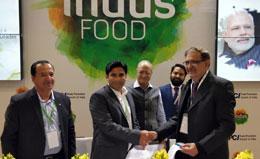“Indus Food” to showcase 500 food suppliers

By Mata Press Service
As a diplomat stationed at India’s consulate in Vancouver, Suresh Makhijani never missed an opportunity to taste the culinary delights of Canada’s west coast city.
“This is a fabulous city for all kinds of food from all over the world,” said Makhijani, who was back in Vancouver last week in his new role as de facto Food Ambassador, working to establish a more robust food corridor between Canada and India.
“More Indian food products in Canada will help Vancouver’s culinary reputation to grow globally,” Makhijani told the South Asian Post.
He urged the Indian diaspora in Canada to continue showcasing food products from India.
“They are the best ambassadors of Indian foods,” he said.
Canada is home to one of the largest South Asian communities abroad per capita, with approximately 3.6 percent of Canadians or 1. 2 million people being of Indian heritage.
Makhijani, who is now the joint director-general of the Trade Promotion Council of India (TPCI) was in Toronto and Vancouver this month meeting with Canadian food importers, processors, and supermarkets to invite their representatives to attend “Indus Food” – the largest food export promotion event in India.
“We will have about 600 global buyers meeting with about 500 Indian food suppliers in 15 product zones,” Makhijani said.
“Indus Food is India’s official, export-focussed F&B Trade fair showcasing the country’s best line-up of food and agri-products to global buyers,” he said.
Makhijani’s mission to help create a strong food corridor between the two countries is part of India’s plan to double up its food and agriculture exports from the existing US$30bn to US$60bn by 2022.
In terms of market size, the Indian food market was worth USD 193 billion in 2016 and is expected to cross USD 540 billion by 2020.
The Food Safety and Standards Authority of India (FSSAI) has plans to invest about USD 72.3 million to strengthen the food testing infrastructure by upgrading food testing laboratories and setting up new mobile testing labs.
In 2016-17, marine products, meat, and rice together made up 52% of India’s agri-export basket. India also exports spices, cotton, fresh fruits and vegetables, sugar, coffee, groundnut, oilmeals, and cashews, which together with marine items, rice and meat comprised over 80% of the agri-export basket in 2016-17.
India is growing as a market for new products such as breakfast cereals, pasta, infant food, bakery products, foreign liquor and different types of oils and sauces, said Makhijani.
India’s frozen food market, which stood at $310 million in 2017, is also projected to grow over 16 per cent to reach $754 million by 2023.
Last April, Canada was one of eight countries that India signed deals with for agricultural exports as it seeks to grow its farm exports.
Makhijani said, “Indus Food” provides the ideal platform for the Canadian food industry to source, network and connect with key players in the Indian Food & Beverage market.
“There is a huge potential at the event for Canadian food importers to explore India in multiple food product segments and source from India,” he said.
A total of US $650 million business was generated in last year’s Indus Food event in form of spot orders, he said.
The second edition of Indus Food will be held on January 14 and 15, 2019 at the India Exposition Mart in Greater Noida, outside New Delhi. The Indian government is providing airfares and hotel accommodation for Canadian food importers wanting to attend the event.
More information on the Indus Food Exposition can be found at www.tpci.in
By the numbers
40% of the global production of mangoes and guavas.
23% of the global production of tea.
22% of the global production of rice.
70% of the global spice production.
21% of the global production of pulses and sugarcane each.
43% of the global production of buffalo meat.
27% of the global production of bananas.
19% of the global production of milk.









